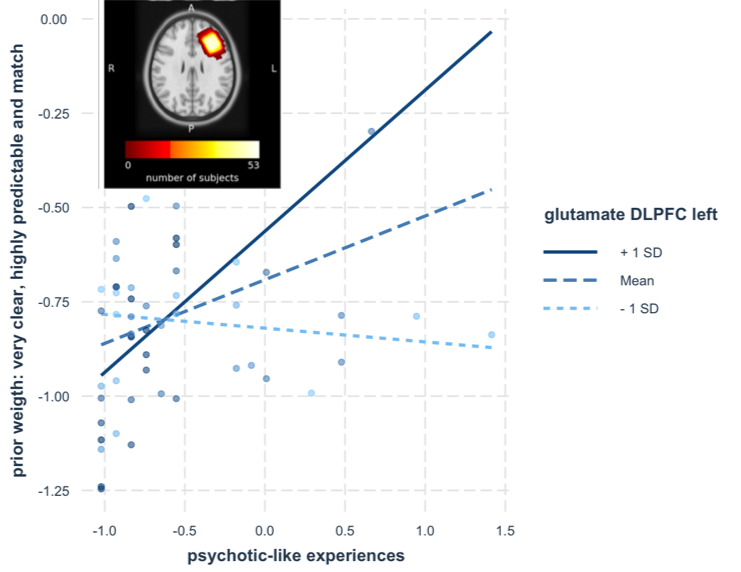Klinikum rechts der Isar Technische Universität München
Neuro-Kopf-Zentrum
Abteilung für Neuroradiologie
Forschungsgruppen und Projekte
Computational and cognitive neuroscience
Summary
In order to make sense of our noisy and ambiguous environment, the human brain is constantly generating predictions to facilitate the processing of incoming sensory information. We are using theory of Bayesian inference and predictive processing to develop computational models for understanding the mechanistic underpinnings of cognitive processing in healthy brains, studying inter-individual differences using personality traits, and of potential cognitive alterations in psychiatric disorders, such as psychosis. The aim of the modelling is to build unifying approaches that allow translation between different cognitive domains such as decision making, language or memory processing. In our research, we therefore develop and apply computational models to novel behavioural paradigms, which combine different cognitive domains (e.g., language processing and episodic memory), and brain data (i.e., f/MRI, EEG, spectroscopy, PET).
Please, visit my webpage for current projects and open positions: https://franziskaknolle.com

Fig: Levels of glutamate in the left DLPFC predict how much individuals with increase psychotic-like experiences rely on prior knowledge during language comprehension.
Leitung
Mitarbeiter
Elisabeth F. Sterner (PhD Candidate);
Pritha Sen (PhD Candidate);
Verena F. Demler (MD science Candidate);
Zachary Tefertiller (PhD Candidate);
Julia Kohler (MD science Candidate);
Onur Icin (PhD Candidate);
Kevin Agboka (MD Candidate);
Daniel Zewen (MD Candidate)
Kooperation
- Dr Lucy MacGregor (University of Cambridge);
- Dr James Kesby (University of Queensland);
- Dr Helen Blank (UKE Hamburg);
- Dr Kelly Diederen (King’s College London);
- Prof Chris Mathys (Aarhus University);
- Prof Graham Murray (University of Cambridge)
Ausgewählte Publikationen
Knolle F, Sterner EF, Moutoussi M, Adams R, Griffin JD, Haarsma J, Taverne H, NSPN Consortium, Goodyer IM, Fletcher PC, and Murray GK. (2023). Action selection in early stages of psychosis: an active inference approach. Journal of Psychiatry and Neuroscience, 48 (1), E78-E89.
Knolle F, Arumugham SS, Barker R, et al. (2023). Grey matter morphometric biomarkers for classifying early schizophrenia and PD psychosis: a multicentre study. npc Parkinson’s Disease, 8;9(1):87.
Kesby, J., Murray, G.K., Knolle, F. (2021). Neural circuitry of salience and reward processing in psychosis. Biological Psychiatry GOS.
Haarsma, J., Knolle, F., Griffin, J.D., Taverne, H. Mada, M., Goodyer, I.M., the NSPN Consortium, Fletcher, P.C., Murray, G.K. (2020).Influence of prior beliefs on perception in early psychosis: effects of illness stage and hierarchical level of belief. Journal Abnormal Psychology ,129(6), 581-598.
Ermakova*, A.O., Knolle*, F., Justicia, A., Bullmore, E.T., Jones, P.J., Robbins, T.W., Fletcher, P.C., & Murray, G.K. (2018). Abnormal reward prediction error signalling in antipsychotic naïve individuals with first episode psychosis or clinical risk for psychosis. Neuropsychopharmacology, 43, 1691–1699. * Joint first author.